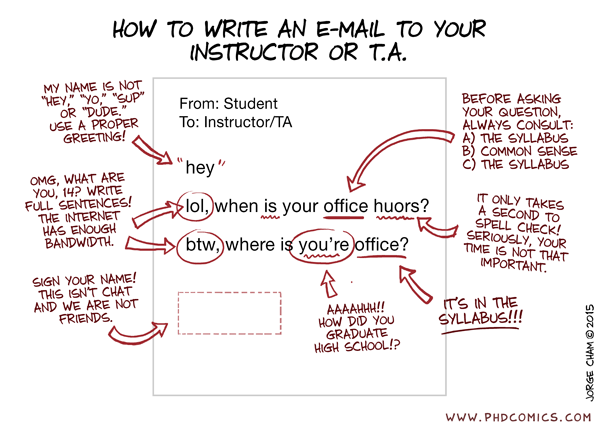Reproduced with permission from “Piled Higher and Deeper” by Jorge Cham
www.phdcomics.com.
Like every other teacher, from time to time, I receive an email from a student written in an excessively informal style. Cham’s comic, reproduced above, is pretty close to some of the emails we receive. About a year ago, after receiving yet another such email, I decided to send the following to one of my classes (copied unedited in its entirety):
There’s more to university than just learning formal material, so I hope you won’t mind if, from time to time, I give you some life advice.
Recently, I have received a number of emails from students that start with “hey”, or other equally informal forms of address. Now, I don’t insist that you call me “Professor Roussel” (although you certainly can), but you should watch how you write emails to people who aren’t in your close circle of friends. At this point, you are training to become professionals. You will (hopefully) all end up in responsible positions where you will eventually be interacting both with people supervising you and with people you are supervising. Both your superiors and the people who report to you expect professionals to maintain a certain level of decorum, and people sometimes get very offended when an email starts with “hey”. It’s just not a respectful form of address.
You’re now at a place where we expect a bit more formality. It’s time to start writing emails that look like they were written by a grownup. Take a moment to write a proper greeting when you’re writing one of your instructors. “Dear Marc” is OK, if you’re comfortable with that. Otherwise, “Professor Roussel” will do fine. Most of your emails will be asking your instructors for something: information, help with something, an appointment. It’s best in those cases to put your best foot forward and to be polite. Moreover, this is where you form the habits that will carry you through your first few years of work. You just don’t want to write your boss an email that starts with “hey”.
By the way, this isn’t directed at anyone in particular. I don’t require an apology from anyone. I just want to help you take the next step in your development as young adults.
Some months later, I was approached by a fellow faculty member who told me that a young person she knew had told her about this email, and that she liked it so much that she was planning to show it to some of her students (with my permission, which I was only too happy to give). And then there’s a blog post by Chris Blattman on email etiquette for students that contains somewhat similar comments, as well as the brilliant Ph.D. comic (which was published and added to this blog post long after this blog post was originally written). (Thanks to Paul Hayes for bringing Blattman’s blog post to my attention.) Clearly I’m not the only person who thinks this way.
I wrote the above email to my students thinking that I would get them thinking about appropriate levels of formality for different situations. (Other than the indirect report mentioned above and one other indirect report, I have no idea whether I made any impact. There was one student who commented on their teaching evaluation that they thought this email wasn’t treating them “as adults”, but of course the point of my email was that some of them weren’t writing adult emails.) As I wrote at the time, university isn’t just about learning specific subject matter, and I worry that the current generation of students is badly equipped for the social aspects of the work world. A lot of the rapid communication methods we have now assume a certain level of informality. (You’re not going to have elaborate greetings in a 140-character tweet or, generally, in a text message composed on a phone.) The problem is that this informal style of communication doesn’t translate well to other media, to many social situations, across age groups, or across cultures. When, where and how are students supposed to learn this? It seems to me that electronic etiquette has to be woven into the informal curriculum from a young age, and that it needs to be reinforced all the way through the education system. Right now, we have a generation of teachers (and I include myself in this group) who mostly came to electronic communications after they had learned other means of communication. While, in many contexts, this is viewed as a disadvantage, in this case I think that we older folk are actually better equipped to navigate the multiple levels of formality needed to get through a day, including the correct levels of formality to use in various forms of electronic communications. When I was learning to write letters in school, they first taught us how to write formal letters. Having learned what a formal letter looked like, relaxing some of these rules when communicating with friends or loved ones became a conscious choice, making it unlikely that we would, say, write an overly informal memo to the boss. Going the other way, starting with informal communication styles and then trying to raise the level of formality as required, is, I suspect, much harder.

